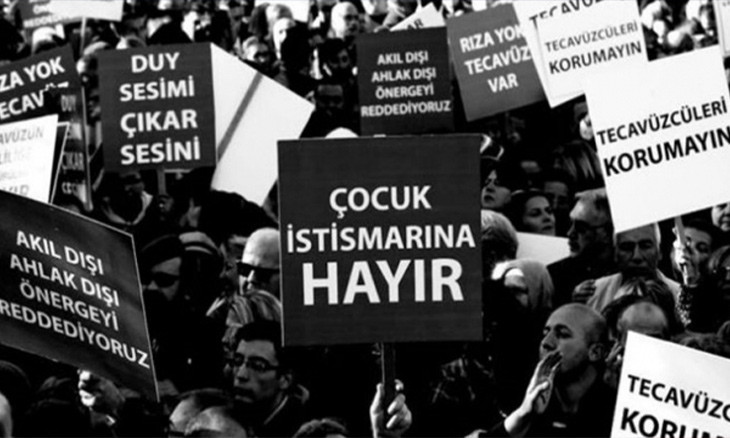Turkish actress' celebration of daughter's first period stirs patriarchal rage
Turkish actress Ceyda Düvenci's celebration of her daughter's first period on social media stirred outrage as female sexuality is often taboo among the population in Turkey. The real shame lies in the blood of the women who are killed in the country every day, many women's organizations noted in support of Düvenci.
Duvar English
Turkish actress Ceyda Düvenci's celebration of her daughter's first period on social media stirred outrage online, with one side claiming she had overshared inappropriately, and women's activists taking the opportunity to highlight patriarchal injustices in Turkish society.
Düvenci shared a photo of her daughter, who suffers from cerebral palsy, on Jan. 19, with the caption "My sweetheart became a young woman."
"Let the rituals begin. Let's celebrate this new time in your life," the actress wrote about her daughter.
As a result of the taboo attached to female sexuality in Turkey's culture, Düvenci received backlash from some social media users who claimed that sharing her daughter's first period with the world was shameful and that it should have remained private.
"I will have rituals to make sure that she understands her body and can protect it, and that she values herself," the actress said in a second post responding to critics, and added that she believes all changes in a young person's life should be celebrated.
As the Turkish word for "period" rose to the top trending topic on Twitter on Jan. 20, many social media users who backed Düvenci noted the double standards which exist between female and male children: Families in Turkey often organize wedding-like celebrations for their sons' circumcisions, an extremely common practice in the majority-Muslim country.
"Parents who puff up their chests and brag about that son 'became a man' after their circumcision loitered in the comments of [Düvenci's] post with their cries of 'shame,'" one user noted.
Ceyda düvenci kızının regl olup genc kızlığa adım attığını sosyal medya paylaşmış.Erkek çocuğunun sünnetinden sonra ‘adam’ olduğu müjdesiyle düğün yapıp gerile gerile gezen ebeveynler de paylaşımın altını “ayıp...”nidalarıyla kirletmişler.Evet yıl 2021 ve hala bu zihniyet...
— aley (@_aleys_) January 19, 2021
Drawing attention to a much more fatal double standard, many women's organizations said that the real blood that is shameful is the blood of all women killed in femicides.
"Periods are natural. Shaming women's bodies and lives only deepens gender inequality," non-governmental Women's Assemblies wrote. "You should be ashamed of young women being murdered, assaulted, and abused every day, not of their periods."
#Regl olmak doğaldır. Kadınların bedenlerinin, hayatlarının utanılması, saklanması gerektiğini söylemek toplumsal cinsiyet eşitsizliğini derinleştirir.
— Üniversite Kadın Meclisleri (@unikadinmeclisi) January 20, 2021
Genç kadınların her gün öldürülmesinden, şiddete ve istismara uğramasından utanın reglden değil.
Another social media user noted the double standard of shaming between men and women, pointing out that men are often not even publicly shamed for criminal behavior.
"The people who shamed Ceyda Düvenci belong to the same mentality as those who welcomed Osman Çur with a celebration when he came out of prison for raping his own niece. When it comes to women, everything is quiet, but everything about men is roaring," one user said.
Bugün kızının regl olduğunu paylaşan Ceyda Düvenci'ye tepki gösterenlerle,dün öz yeğenine tecavüz eden Osman Çur'u tahliye edildiği cezaevi önünde davullu zurnalı karşılayanlar aynı zihniyetin ürünü.Kadın olunca her şey sessiz sedasız olmalı,erkek olunca gümbür gümbür.İkiyüzlüler
— Larke Tanner (@beverly_hills0) January 19, 2021
The Turkish judiciary has proven its reluctance in prosecuting men for violent crimes against women in innumerable cases, a mistake that continues to cost women their lives as their petitions for legal and physical protection are often met with inaction.
Most recently, a Turkish court ruled on Jan. 13 that police officers weren't guilty of neglect in the femicide of Ayşe Tuba Arslan, who was killed in 2019 by the man against whom she had issued 23 criminal complaints in western Eskişehir.

 Femicide protesters accused of battering İzmir police who beat themWomen
Femicide protesters accused of battering İzmir police who beat themWomen Turkish man kills ex-fiancé, her mother hours after restraining order petitionHuman Rights
Turkish man kills ex-fiancé, her mother hours after restraining order petitionHuman Rights Turkish court acquits father of abusing his six year old because 'virginity remained intact'Human Rights
Turkish court acquits father of abusing his six year old because 'virginity remained intact'Human Rights